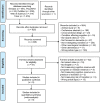Cognitive Reserve, Alzheimer's Neuropathology, and Risk of Dementia: A Systematic Review and Meta-Analysis
- PMID: 33415533
- PMCID: PMC7790730
- DOI: 10.1007/s11065-021-09478-4
Cognitive Reserve, Alzheimer's Neuropathology, and Risk of Dementia: A Systematic Review and Meta-Analysis
Abstract
Cognitive reserve (CR) may reduce the risk of dementia. We summarized the effect of CR on progression to mild cognitive impairment (MCI) or dementia in studies accounting for Alzheimer's disease (AD)-related structural pathology and biomarkers. Literature search was conducted in Web of Science, PubMed, Embase, and PsycINFO. Relevant articles were longitudinal, in English, and investigating MCI or dementia incidence. Meta-analysis was conducted on nine articles, four measuring CR as cognitive residual of neuropathology and five as composite psychosocial proxies (e.g., education). High CR was related to a 47% reduced relative risk of MCI or dementia (pooled-hazard ratio: 0.53 [0.35, 0.81]), with residual-based CR reducing risk by 62% and proxy-based CR by 48%. CR protects against MCI and dementia progression above and beyond the effect of AD-related structural pathology and biomarkers. The finding that proxy-based measures of CR rivaled residual-based measures in terms of effect on dementia incidence underscores the importance of early- and mid-life factors in preventing dementia later.
Keywords: Aβ; CSF; Cognitive reserve; Dementia; MRI; Tau.
Conflict of interest statement
The authors declare that they have no conflict of interest.
Figures



References
Publication types
MeSH terms
LinkOut - more resources
Full Text Sources
Other Literature Sources
Medical

